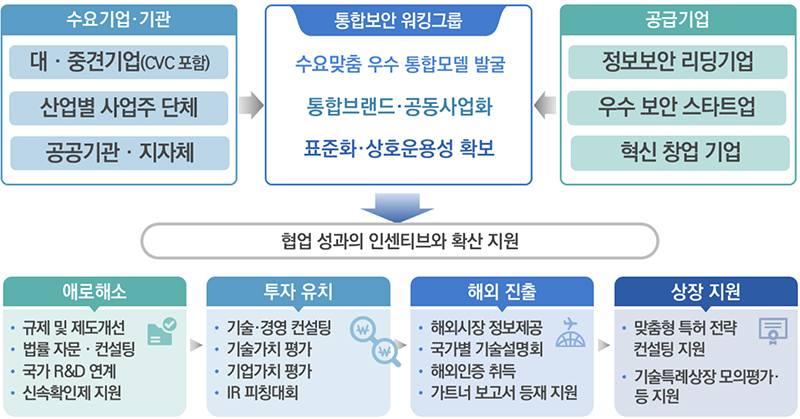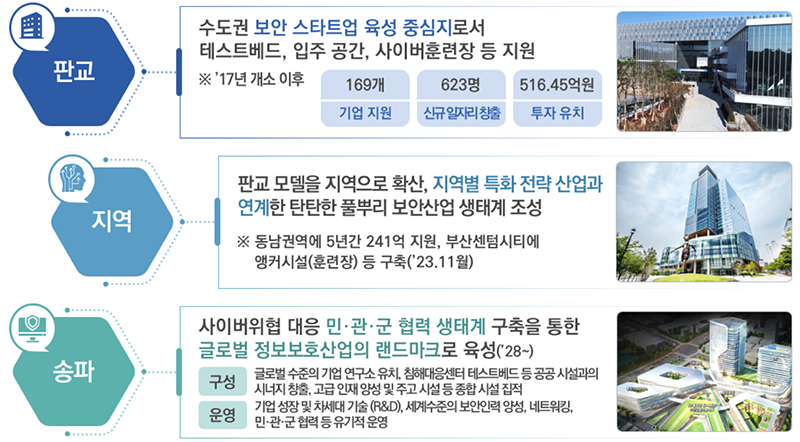Announcement of ‘Strategy for securing global competitiveness’… Achieving market size of KRW 30 trillion and fostering security unicorns
The government is accelerating its efforts to become a powerhouse in the ‘global information security industry’ with the goal of entering the world’s top 5 in the information security industry by 2027.
Accordingly, with the goal of achieving a market size of 30 trillion won, a total of 1.1 trillion won was invested in the related budget, and a ‘cyber security fund’ worth a total of 130 billion won was created to foster security unicorn companies in earnest.
In addition, we plan to promote security paradigm shift pilot projects in major basic fields such as communications, finance, and medical care, and expand global export support by forming the ‘K-Security Alliance’ to develop an innovative integrated security model.
The Ministry of Science and ICT announced the ‘Strategy to Secure Global Competitiveness in the Information Security Industry’ at the 30th Emergency Economic Vice Ministers’ Meeting held on the 5th and announced that it would realize ‘robust cyber security’ by strengthening the competitiveness of our information security industry. .
Recently, the global security market has been growing due to the increase in cyber threats and the expansion of the security area due to digitalization as well as the strengthening of security regulations in each country, and it is predicted that it will continue to grow at an average annual rate of 8.5% until 2026.
In particular, the fierce competition for leadership among leading companies seeking to dominate the rapidly growing global cybersecurity market is accelerating due to security paradigm shifts such as zero trust and integrated security.
President Yoon Seok-yeol also emphasized several times that “strengthening cyber security capabilities is the core of national security,” and the recent expansion of cooperation in the cyber field through active visits to the United States, Japan, the Middle East, and Southeast Asia is in line with this context.
Accordingly, the Ministry of Science and ICT has prepared this strategy to foster an information security industry that does not lag behind in global market competition in order to realize ‘robust cyber security’ and to promote new and quick measures to preempt the shift in the cyber security paradigm.

◆ Secure leadership in security paradigm shift and create new markets
We create a new security market by applying a new security system according to the security paradigm shift and internalizing security in future industries such as smart factories, smart healthcare, robots, and space and aviation.
In addition, we will focus on fostering the convergence security and physical security industries to expand our reach into the global security market.
Accordingly, a ‘Zero Trust Transition Roadmap’ was established to resolve the limitations of existing border security, and a pilot project was promoted to apply and expand the existing border model as a zero trust security model, focusing on basic fields such as telecommunications, finance, and medical care. We will strengthen the security paradigm shift.
In addition, it actively responds to SW supply chain attacks and establishes an ‘SBOM-based SW supply chain security technical support system’ to prepare for overseas trade barriers, and supports supply chain security management for areas with high ripple effects such as security SW and medical SW.
We will also pursue work to pioneer the future convergence security market through organic cooperation and preemptive security internalization.
To strategically respond to the security requirements of each major new industry, a ‘convergence security cooperation system’ will be established by related ministries and organizations, the existing security living lab will be specialized and reorganized into core areas, and a security certification internalization process will be established based on this.

We foster physical security as a next-generation growth industry by applying and disseminating domestically produced new technologies.
To this end, we plan to expand the distribution of CCTV semiconductor chips, a key component domestically produced through government R&D, from 10 to 40 companies, and quickly mass-produce second-generation semiconductor chips to expand the global market share of domestically produced products.
In addition, the biometric performance evaluation field centered on fingerprints and faces will be expanded to include veins and iris, and the biometric physical security market will be expanded by building more than 600,000 pieces of related data using new technologies such as AI.
In particular, the ‘Korean-type unmanned store’, which integrates domestic security technologies, is implemented and commercialized through demonstration, while the developed excellent unmanned technology and products are supported to small business unmanned stores to solve social problems such as crime and expand the unmanned security market. .
◆ Strengthening entry into emerging markets by creating a foundation for collaboration
Based on cooperation between companies, we implement an innovative integrated security model and strategically target emerging markets to secure the competitiveness of our companies in the global market.
First, we form the ‘K-Security Alliance, a private sector-led strategic collaboration promotion alliance’ to develop innovative integrated solutions and services.
Through this, the private sector is actively encouraged to lead the joint/collaborative integrated security commercialization model, standardization, and securing interoperability, while the government provides full support for resolving corporate difficulties and for market, investment, and overseas expansion.

Starting next year, we plan to select excellent integrated security models through a contest based on field demand and use them as a catalyst for activating collaboration.
Actively induce the creation of ‘Stronger Together’, a global trend, through collaboration performance sharing meetings, publication of performance casebooks and collaboration guides, and establishment of excellent interoperability standards.
In order to expand and promote projects related to entry into emerging security markets based on international cooperation, the Middle East base will be reorganized into Saudi Arabia to target emerging markets such as the Middle East and Southeast Asia, and a new base in Vietnam (Hanoi) will be established.
Maximize the possibility of winning large-scale overseas projects led by the public sector through the formation and support of the public-private cooperation type Security Team Korea for winning projects for the Middle East and Southeast Asia fund and public procurement projects, and after receiving the orders, through the participation of domestic operators, corporate indirect Enhance export effectiveness.
◆ Expanding a solid industrial ecosystem for global expansion
In order to accelerate the advancement of Korean companies into the global market, intensive investments are made to create an environment for sustainable growth, such as facility expansion, fund creation, and human resource development.
Accordingly, the K-Security Cluster Belt, which consists of fostering security startups (Pangyo), strengthening the local security industry (Buulgyeong), and global security cluster (Songpa), will be created and fostered as a forward base for accelerating overseas expansion of Korean companies.

A cyber security fund is created and used as a priming water for private investment, and a public-private joint venture of KRW 130 billion will be created by 2027 to promote stable technology development and private investment in companies.
In addition, it plans to induce investment of more than 50% of the fund formation to support start-ups in promising fields such as Zero Trust and AI, and to support scale-up through M&A between companies.
◆ Securing competitiveness in next-generation information security technology
We focus on strategic technology development essential for future industrial growth, and focus on securing technological prowess to gain an edge in the global technological hegemony competition through joint research with leading countries.
In order to secure key cybersecurity technologies necessary for future response, we derive major R&D areas such as future challenges, technology/industry leadership, and security investment, and maximize results by promoting strategic investments by selecting and focusing on each area.
In addition, it promotes securing global-level technology through joint research with leading countries with strengths in cyber security, such as the United States, Germany, and Finland.
We also plan to promote new research to support emerging countries to strategically target major emerging markets such as Southeast Asia and the Middle East.

Minister of Science and ICT Lee Jong-ho emphasized, “Recently, the global security market is in a period of upheaval, with active collaboration and cooperation between companies to keep up with the trend of integrated security amid accelerating competition to preoccupy a new security paradigm.”
“It is an urgent task that cannot be delayed even for a day to prepare for a new security paradigm shift and create a solid industrial ecosystem to target emerging markets,” he said.
“Through this strategy, the government will focus its capabilities so that our information security industry can secure global competitiveness and expand market leadership to strengthen cyber security with our own strength,” he said.
Inquiries: Ministry of Science and ICT, Information Security Network Policy Bureau, Information Security Industry Division (044-202-6451), Information Security Planning Division (044-202-6448)
Source: Policy news – Ministry of Science and ICT, link
Photo source: Ministry of Science and ICT – “공공누리 제4유형”

Comments